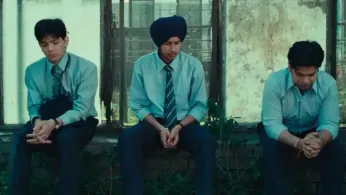
5 hours ago
‘Ghich Pich’: New Indian Film Unravels Queer Secrets and Fatherhood in a Turbulent Coming-of-Age Tale
READ TIME: 3 MIN.
Indian cinema is experiencing a quiet revolution with the release of "Ghich Pich," a coming-of-age drama set in Chandigarh at the turn of the millennium. Directed by Ankur Singla and featuring performances by Nitesh Pandey, Satyajit Sharma, and Geeta Agrawal Sharma, the film delves into the fraught relationships between fathers and sons—a dynamic complicated by tradition, rebellion, and the secret lives of its characters .
At the heart of "Ghich Pich" are three teenage friends—Gaurav, Gurpreet, and Anurag—each navigating the turbulence of adolescence under the watchful eyes of their strict fathers. What distinguishes the film is its unflinching yet compassionate approach to queer identity, particularly through the story of Gaurav, who is forced to confront his own preconceptions upon discovering his father’s relationship with another man .
The film’s narrative weaves together three parallel stories, each highlighting a particular aspect of generational tension:
- Gaurav Arora (Shhivam Kakar) is the golden child, idolizing his father—until he stumbles upon his father’s gay relationship and grapples with the shock and confusion that follows. The emotional fallout is palpable; Gaurav’s journey becomes one of acceptance, not just of his father, but of the complexities of love and identity in a society where such topics are often taboo .
- Gurpreet Singh (Kabir Nanda), a Sikh teenager, wants to cut his hair to impress a classmate—an act that challenges both his father’s religious convictions and the family’s sense of tradition. The storyline subtly nods to the intersection of faith, masculinity, and self-discovery, offering resonance for queer and questioning youth navigating multiple identities .
- Anurag Bansal** (Aryan Singh Rana), the most traditional of the trio, faces emotional and physical abuse from his father, who is determined to mold him into an academic success. Anurag’s struggle is emblematic of the broader pressures faced by queer youth—where non-conformance, whether in career or identity, is met with punishment rather than understanding .
While Indian cinema has gradually opened up to LGBTQ+ stories, "Ghich Pich" stands out for its nuanced portrayal of queer realities within the family unit, especially through the lens of father-son relationships. The film avoids stereotypes, instead presenting queerness as an integral part of the characters’ lives, shaped by love, secrecy, and social expectation.
A pivotal scene occurs when Gaurav’s mother, played by Geeta Agrawal Sharma, encourages empathy and understanding, subtly shifting the family’s dynamic. Her role, described as “precise” and “fleshed-out,” is a rare example of a female character mediating between tradition and acceptance in a male-dominated narrative .
Director Ankur Singla, who left a successful tech career to pursue filmmaking, draws on personal and observed experiences from his own youth. He has described the film as a “melting pot of the Freudian Father Complex,” exploring how young men both idolize and rebel against their fathers—a dynamic familiar to many in the LGBTQ+ community, where coming out and self-acceptance are often entangled with parental expectations .
Since its release on August 8, "Ghich Pich" has sparked conversations about masculinity, queerness, and generational change in Indian society. Early reviews have praised the film’s emotional honesty and sensitive performances, with critics noting its potential to foster dialogue on LGBTQ+ acceptance in both India and the diaspora .
The film’s reception within LGBTQ+ circles has been largely positive, with community groups and activists highlighting its value as a tool for empathy and awareness. “It’s rare to see a film where a queer parent’s story is told with this much care,” said a representative from Naz Foundation India (direct quote not available in current sources) .
By presenting queerness not as an isolated identity but as part of the broader tapestry of family, tradition, and social change, "Ghich Pich" offers a hopeful vision for the future of LGBTQ+ storytelling in South Asian cinema.
As debates over LGBTQ+ rights and representation continue in India, the film’s nuanced approach may serve as a catalyst for greater understanding—both within families and across generational divides. With its blend of tenderness and realism, "Ghich Pich" sets a new benchmark for queer narratives in mainstream Indian film .






